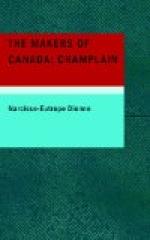[12] Pierre de Chauvin, Sieur de la Pierre, called Captain Pierre by Champlain, was born at Dieppe, but after the death of his relative, Pierre de Chauvin, Sieur de Tontuit, he resided at Honfleur. There were many families of Chauvin in Normandy during the seventeenth century, notably the Chauvins, Sieurs de Tontuit, and the Chauvins, Sieurs de la Pierre.
CHAPTER IV
CHAMPLAIN’S VOYAGES OF 1610, 1611, 1613
Champlain embarked at Honfleur with eleven artisans for Quebec, on March 7th, 1610. The rough weather experienced during the first days of the voyage rendered it necessary for the vessel to run into Portland, on the English coast, and later to seek refuge in the harbour of the Isle of Wight. At this time Champlain was taken suddenly ill, and was obliged to return by boat to Havre de Grace to undergo medical treatment. A month after he rejoined his former vessel, which in the meantime had returned to Honfleur to take in ballast. Champlain had now somewhat recovered, although he was still weak and ill.
The vessel left Honfleur on April 8th, and reached Tadousac on the 26th of the same month; which was one of the shortest passages ever made up to that time. “There were vessels,” says Champlain, “which had arrived on the 18th of the month, a thing which had not been seen for more than sixty years, as the old mariners said who sail regularly to this country.” This remark proves that for more than half a century French fishermen and navigators had been accustomed to proceed as far as Tadousac. A Basque, named Lavalette, who had been accustomed to fish on the Acadian coast from about the year 1565, also confirms the statement.
On his arrival at Tadousac, Champlain ascertained from a young nobleman, named du Parc,[13] who had wintered with Chauvin at Quebec, that all the settlers were in good health, and that only a few of them had been slightly ill. They had been able to procure fresh meat during the whole season, and consequently scurvy had not made its appearance. “By avoiding salt food and using fresh meat, the health is as good here as in France.”
The Indians had been waiting from day to day for the return of Champlain, for they wished him to accompany them to war. He therefore went ashore to assure them that he would fulfil his promise under the conditions made, namely, that upon his return they would point out to him the three rivers, and the lake which they had described as resembling a sea, the end of which could not be seen, and by means of which he could return by way of the Saguenay to Tadousac. The Indians had readily promised to do all this, but only in the following year. Champlain had also promised the Hurons and Algonquins that he would assist them in their wars, if they would show him their country, the great lake and the copper mines. “I had accordingly,” he said, “two strings to my bow, so that, in case one should break, the other might hold.”




